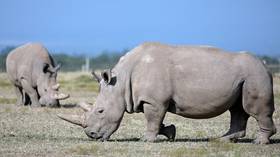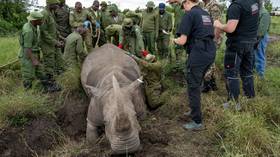Scientists record world’s first in vitro rhino pregnancy

Scientists with the BioRescue research consortium in Kenya have recorded the world’s first pregnancy in a rhino following a successful embryo transfer, potentially paving the way to save Africa’s northern white subspecies from extinction.
The embryo of a southern white rhino, created in vitro from egg cells and sperm, was transferred into a surrogate mother at Kenya’s Ol Pejeta Conservancy last year, the team said in a statement on Wednesday.
”The BioRescue team confirmed a pregnancy of 70 days with a well-developed 6.4 cm long male embryo,” it announced. However, the mother rhino named Curra and her fetus have died from a bacterial infection.
”It is bitter that this milestone is confirmed under such tragic circumstances with the death of the surrogate Curra and her unborn calf, but I am certain that this proof of concept is a turn of the tide for the survival of the northern white rhino and the health of Central-African ecosystems,” BioRescue project chief Thomas Hildebrandt said.
Fatu and her mother, Najin, are the world’s two remaining northern white rhinos, living on Kenya’s 90,000-acre Ol Pejeta wildlife conservancy, under protection from poaching.
The northern white rhino was pronounced functionally extinct after the last male, Sudan, died in 2018.
Last year, BioRescue announced that five new embryos had been created to rescue the endangered African mammal under the project, funded mainly by the German Federal Ministry of Education and Research.
The consortium said 18 eggs had been collected from Fatu and fertilized with sperm from two different bulls to improve genetic diversity. The zygotes were then cryopreserved – a process that keeps them at low temperatures for later transfer to surrogate-identified wild southern white rhino females – as neither Fatu nor Najin are able to carry a pregnancy to full term.
According to the scientists, the next step in the project will be to select and prepare a new teaser bull, which will reveal when potential surrogate mothers can be implanted with embryos.













